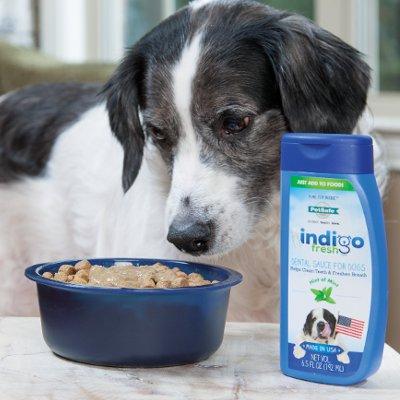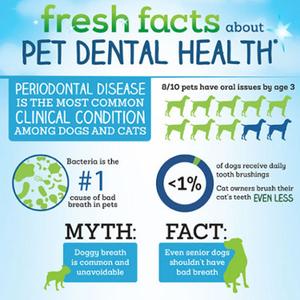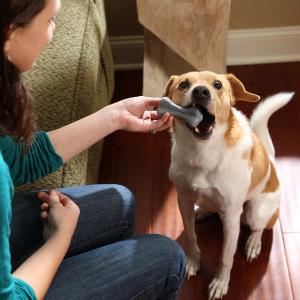Severe and untreated dental disease can affect every part of your pet’s body, not to mention that it can be very painful, so a little knowledge is power when it comes to your pet's oral health. If you've ever had severe tooth pain, you can surely relate to what your pets may be going through. They get all the same kinds of tooth problems that people do. Below are some answers to common pet owner questions about dental diseases in pets.
How common is dental disease in pets?
Probably more common than many realize. 2 out of 3 cats and 8 out of 10 dogs older than 3 have some degree of dental disease.
What are the signs and symptoms of dental disease?
There are a number of things that should alert you to dental disease in your pet.
-
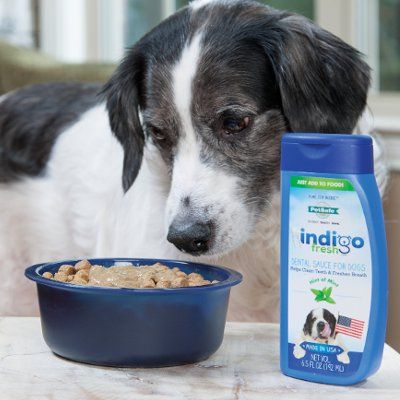 Decreased appetite
Decreased appetite - Approaching the food and then backing away if their teeth hurt
- Chewing with obvious caution and discomfort
- Dropping food from the mouth
- Very unpleasant breath odor
- Pawing at their mouth
What causes dental disease?
The most common cause of dental disease is tartar accumulation. Pets accumulate bacteria on the surface of their teeth, which can mineralize to form tartar over time. Tartar starts at the gums, especially on the back teeth. In severe cases it can cover the entire tooth.
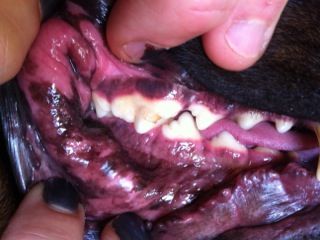 Tartar on the teeth leads to gingivitis or inflammation of the gums. For early disease, a thorough dental cleaning by your veterinarian will lead to a full recovery. This is where prevention with daily brushing and special dental treats can be very important. Your veterinarian can help show you proper brushing technique.
Tartar on the teeth leads to gingivitis or inflammation of the gums. For early disease, a thorough dental cleaning by your veterinarian will lead to a full recovery. This is where prevention with daily brushing and special dental treats can be very important. Your veterinarian can help show you proper brushing technique.
If gingivitis is allowed to progress, irreversible periodontal disease can occur. The bone that supports the tooth is destroyed, leading to tooth loss and infection around the tooth root. Infection may spread deep into the tooth socket, creating an abscess, or it can enter the blood stream affecting the heart, kidneys, and other internal organs.
What should I do if my pet has signs of dental problems?
If your pet has evidence of dental disease you should take them to your family veterinarian for an examination and cleaning. All dental cleanings are done under short-acting general anesthesia. X-rays can help determine if a tooth has disease where the naked eye can't see, below the gums and into the roots. Dental X-rays are a vital part of a dental cleaning.
For complicated tooth issues, go to a veterinary dentist, a specialist in oral surgery and dental restoration like crowns. Many general practitioners do a very good job of cleaning teeth and most routine dental work. A dental cleaning can cost anywhere from a low of $100-200 to several times that for complex or more involved dental work. The costs are usually higher for older dogs and cats and larger dogs.
Prior to the dental cleaning or dental work, a consultation with the veterinarian performing the procedure is usually required. Blood work or other lab tests may be needed before the anesthesia to help plan the safest way to get the job done.
Just as with people, the rate at which tartar accumulates is really variable between individuals. Usually a dental cleaning every 6-12 months is enough to keep your pet's mouth healthy.
What can I do to help prevent dental disease in my pet?
 Recent advances in pet foods have resulted in diets that can reduce tartar accumulation. Your veterinarian can give you specific recommendations that can benefit your pets and keep teeth clean between professional cleanings. Dental treats help scrape plaque off teeth and keep them shiny and healthy, too.
Recent advances in pet foods have resulted in diets that can reduce tartar accumulation. Your veterinarian can give you specific recommendations that can benefit your pets and keep teeth clean between professional cleanings. Dental treats help scrape plaque off teeth and keep them shiny and healthy, too.
One of the most effective ways to keep teeth healthy is to brush your pet's teeth. Toothpastes and brushes are available from your veterinarian or pet retailer and are specially designed for a pet's mouth. Daily brushing should become a regular part of your home health care routine for your pet, along with grooming, exercise, and nail trims. Most pets become quickly accustomed to tooth-brushing and will let you do it very easily. Pet toothpastes are usually malt or chicken flavor, since dogs and cats would probably not enjoy the usually minty human flavors.
With a little work on your part and little help from your family veterinarian or dental specialist, you can help increase your pet's overall health by keeping their teeth and gums healthy. You'll be glad you did, and you'll love the fresh breath and improved health that comes with it.

